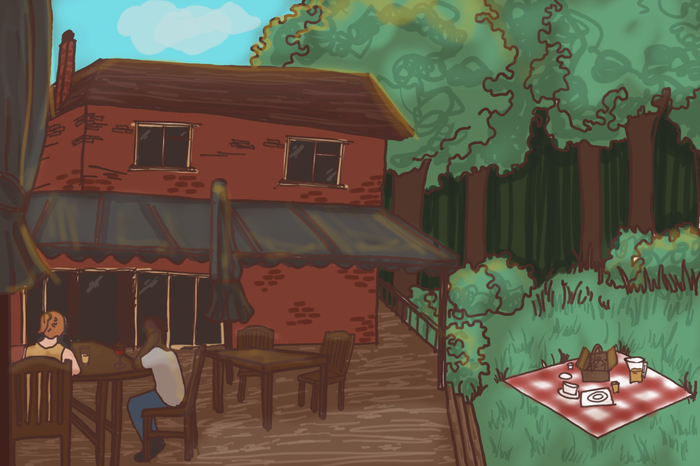The woes of intercollegiate friendships
Olivia Redman tells us about the highs and lows of intercollegiate friendships

About halfway into Lent, I invited a longtime friend of mine – a girl who I went to school with, now a fellow first-year at Newnham – to a formal at my college. We’ve kept in touch and have mutual friends at Cambridge, but we mostly see each other in group settings, so, once we’d sat down in the hall and pretended to care about what wines were being served with the food, we had a lot of small talk to catch up on.
“So,” she asked, “Who would you say your closest friends here are?” “To be honest,” I told her, “my best friend at Cambridge isn’t actually at my college.”
The girl who I’d consider my closest friend at Cambridge – the girl who I text first when I get good news, whose picture appears most in my termly Instagram posts, who I swap clothes with so often that her signature perfume lingers on half of my tops, whose kitchen I always hang about annoyingly in – is at Caius, and I’m at Trinity. We don’t even do the same degree. We met late into Michaelmas, when she was invited to a pub trip by a couple of my classicist friends at her college; by the start of Lent, we were wearing matching outfits on nights out and commiserating about our doomed love lives at formals.
Of course, having friends outside of college has its advantages. Formal invites are the most obvious perk, and, even if you don’t feel like sitting down for a reasonably priced three-course meal in your gown, it’s nice to have somewhere else to go if you really hate whatever your college is serving for dinner. Being able to access other, superior college cafés or bars is another pro (Sidney’s is my personal favourite). If you know people at Newnham or Medwards, you can even go and experience the joy of being able to walk on all the grass.
“By the start of Lent, we were wearing matching outfits on nights out and commiserating about our doomed love lives at formals”
Yet despite all these things, when I told that schoolmate of mine that my best friend at this university wasn’t Trinity, I almost felt guilty saying it – like it was somehow wrong or bizarre that, despite having friends in college and getting on pretty well with most people there, the girl I’m closest to is elsewhere. More importantly, though, this conversation made me wonder why I felt that way. What felt so embarrassing about making friends? Why did it feel so strange to admit that I liked people outside my college’s bubble?
Perhaps this feeling is a uniquely Oxbridge phenomenon. Here, like nowhere else, the college system seems to eclipse the university: you’re part of your college first, and Cambridge second. My older sister went to Durham, which effectively stops being a collegiate university after you stop being a fresher: students rarely live in their colleges after first year, and it’s perfectly normal to end up renting a house with friends from across the university. By contrast, most Cambridge students will live in college accomodation for their entire undergraduate degree. This means that if you have close friends at other colleges, you don’t get to live with them, unless you’re willing to sacrifice the joys of subsidised, short-contract rent and find a private landlord.
“Every stressed “Do you want to work in the faculty today? I’m so cooked” text doubles as an “I miss you””
This inter-collegiate divide is perhaps most noticeable during exam term. I’ll at least see my friends in college in the library, or bump into them leaving after they realise there are no free desks to sit at. When it comes to friends outside of college, there’s a degree of effort involved. Socialising is not as simple as passively smiling at familiar faces in the bar or in plodge. You need to arrange to see people, and in Easter, when revision and the guilt of not doing enough work hangs over everyone’s heads, seeing people becomes a lot harder.
However, I’ve come to realise that, as irritating as these inconveniences can be, they really are nothing more than inconveniences. I’ve heard plenty of horror stories from friends at other universities who have struggled to make friends at all, or who feel there is a lack of community at their place of study. By comparison, the college system is fantastic at bringing people together, and provides an easy way to make friends – if there’s someone you get on well with and want to talk to more, you can invite them to a formal for an excuse to dress nicely, get drunk together and eat well in a beautiful hall. Not just that, but Cambridge itself is a uniquely fantastic city to have friends in. Nobody is ever really far away; even though we all joke about how far away the hill colleges are, a fifteen minute walk from the centre of town is hardly a long way to go to see your friends.
I also think part of what makes intercollegiate friendships so special is that extra energy that they require. Because you don’t live with them, you have to make a conscious effort to go out and see them. Every stressed “Do you want to work in the faculty today? I’m so cooked” text doubles as an “I miss you.” Even if your college can feel like a massive part of your identity, it doesn’t need to completely take over who you are, and there’s no need to feel like you can only socialise with the hundred or so people you matriculated with; friendship is not that simple.
 News / Hundreds of Cambridge academics demand vote on fate of vet course20 February 2026
News / Hundreds of Cambridge academics demand vote on fate of vet course20 February 2026 News / Judge Business School advisor resigns over Epstein and Andrew links18 February 2026
News / Judge Business School advisor resigns over Epstein and Andrew links18 February 2026 News / University Council rescinds University Centre membership20 February 2026
News / University Council rescinds University Centre membership20 February 2026 News / Petition demands University reverse decision on vegan menu20 February 2026
News / Petition demands University reverse decision on vegan menu20 February 2026 News / Caius students fail to pass Pride flag proposal20 February 2026
News / Caius students fail to pass Pride flag proposal20 February 2026










